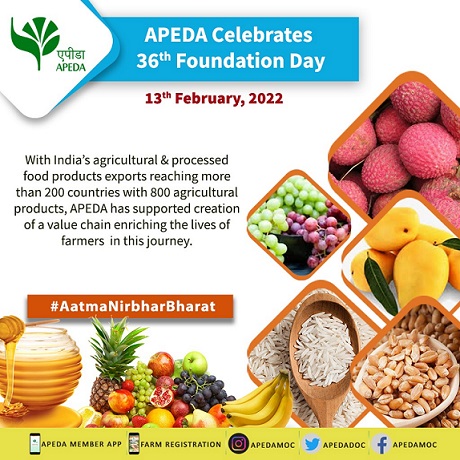By Our Correspondent
NEW DELHI/BHUBANESWAR: Agricultural Products Export Development Authority (APEDA) celebrated its 36th Foundation Day today. APEDA actively supported the Government in taking the export of agricultural products to USD 20.67 billion in 2020-21 from USD 0.6 billion in 1986 when it was founded. APEDA also helped expand the export basket to 205 countries.
The share of APEDA exports (USD 20.67 billion) constituted 49% of overall agri- product exports in 2020-21 out of which, Cereals and fresh horticulture comprised 59%, Cereal preparations and miscellaneous processed items 23% and animal products 18%.
The target given to APEDA in the current financial year (2021-22) is USD 23.7 billion, out of which more than 70% i.e. USD 17.20 billion has been achieved till January 2022, and the remaining target is expected to be completed within the stipulated time period.
Aiming to take export of agricultural products to a new level, APEDA promoted IT-enabled activities for ease of doing business in the promotion and development of exports from India. APEDA has undertaken initiatives like paperless office (re-engineering, digital signatures, electronic payment facility), APEDA Mobile App, phase-wise delivery of online services, monitoring and evaluation, uniform access, and virtual trade fair to make governance more efficient and effective.
Keeping in mind Prime Minister Narendra Modi’s call for ‘vocal for local’ and ‘Atmanirbhar Bharat’, APEDA has been focusing on promotion of exports of locally sourced Geographical Indications (GI) tagged as well as indigenous, ethnic agricultural products. New products and new export destinations have been identified and accordingly the trial shipments have been facilitated.
As on date, there are 417 registered GI products and of them around 150 GI tagged products are agricultural and food GI out of which more than 100 registered GI products fall under the category of APEDA scheduled products (Cereals, Fresh Fruits and vegetables, processed products, etc).
In 2020-21 and in the current fiscal, some of ethnic and GI tagged products exported by India include dragon fruit, patented village rice, jackfruit, jamun, Burmese grapes, dehydrated mahua flowers, puffed rice. GI varieties of mango, GI tagged Shahi litchi, Bhalia wheat, Madurai malli, Mihidana, Sitabhog, Dahanu Gholvad Sapota, Jalgaon banana, Vazhakulam pineapple and Marayoor jiggery, etc.
The implementation of revamped Agri Export Policy is also in the final stage as 21 states and two UTs (Ladakh A&N Islands) have already finalised the state specific action plan. Those states which have specific action plans are Maharashtra, Uttar Pradesh, Kerala, Nagaland, Tamil Nadu, Assam, Punjab, Karnataka, Gujarat, Rajasthan, Andhra Pradesh, Telangana, Manipur, Sikkim, Uttarakhand, Madhya Pradesh, Mizoram, Meghalaya, Tripura, Arunachal Pradesh and Himachal Pradesh. The action plans of the remaining seven states are at different stages of finalisation.
Country specific agri-export strategy reports have been prepared for 60 countries in consultation with the Indian Embassies and High Commissions of the respective countries to tap the opportunities emerging during Covid-19 pandemic and the potential for agri exports to countries.
In coordination with the Government of India’s thrust on ensuring ‘ease of doing business’, APEDA is working with the state governments for ensuring traceability and market linkages for farmers for promoting exports. APEDA’s thrust has been on ensuring digitalization of land records and formalization of tenancy for the farmers, which helps in boosting exports.
A Market Intelligence Cell has been constituted in APEDA and the activity of dissemination of E-market intelligence reports comprising detailed market analysis has commenced.
A Farmer Connect Portal has also been set up by APEDA on its website for providing a platform for Farmer Producers Organisations (FPOs) or Farmer Producer Companies (FPCs), Cooperatives to interact with exporters. Around 3,295 FPOs/FPCs and 3,315 exporters have been registered in the portal so far.
For promoting use of hybrid technology, APEDA has integrated a Blockchain solution into its GrapeNet traceability platform. The GrapeNet is a web-based certification and traceability software system for monitoring fresh grapes exported from India to the European Union. The Blockchain solution, called APEDA Trust Chain, helps track all the details of the export consignment, right down to the location of the vineyards.
Working in collaboration with the Ministry of Commerce & Industry, the APEDA has taken a giant leap in making landlocked Purvanchal a new destination of agri export activities by developing Varanasi Agri – Export Hub in a record time. The Varanasi region, where almost negligible export activities because of lack of basic infrastructure, is now abuzz with agri export activities.
After the intervention of APEDA, Varanasi region has recorded exemplary changes in the export scenario and registered many first-of-its-kind achievements in a very short span of time as about 20,000 tonnes of agri produce have been exported from Purvanchal region in the last six months.
“Notwithstanding several logistical challenges faced in the global trade of commodities, India’s agricultural and processed food exports have grown at a steady pace in the last decade,” Dr. M.Angamuthu, Chairman, APEDA said on the occasion.
Exports of agricultural and processed food products under APEDA basket rose to USD 20.67 billion (Rs 1,53,049crores) during 2020-21, from USD 9.31 billion (Rs 42,437crores) in 2010-11, according to data by the Directorate General of Commercial Intelligence and Statistics (DGCI&S).
In 2018-19, the export of Agricultural and Processed Food Products recorded at USD 19406 million (Rs 1,35,112 crores). Export value stood at USD 20,674 million (Rs 1,53,049 crores) in 2020-21. In the current financial year 2021-22 (April-December), APEDA has exported agricultural and processed food products worth USD 17,465 million (Rs 1,29,782crores).
Even though India is the biggest producer of main agricultural crops, fruits and vegetables, the country’s contribution to the agri-exports in the global market is not significant due to lack of requisite infrastructure at farm gate, post production and logistics complied with other aspects such as awareness about the good agricultural practices, good manufacturing practices, hygienically producing and other latest international standards in the area of quality and packaging, etc, have been the key hindrances in harnessing export potential of the country.
Realising the importance of Agriculture and Processed Food Products export from the country, the Government in 1986 had set up APEDA through an Act of Parliament under the Ministry of Commerce and Industry, Government of India. Then the newly created body replaced the then existing Processed Food Export Promotion Council. The APEDA had been undertaking most of the activities as per its mandate and scope of work allocated spanning its 14 product categories which mainly includes the sector of fruits and vegetables, processed fruits and vegetables, animal, dairy and poultry products and cereals.
Over the years, APEDA has been handling issues concerning product safety and global promotion for all its product categories, compromising more than 800 tariff lines. With the agriculture awareness about environmental and food safety issues in the importing countries and constantly additional food norms and consumer preferences, APEDA has been constantly sensitizing its trade exporters about export requirements and also providing assistance for setting up of infrastructure facilities for common uses and as well as by the concerned member exporters for having export-oriented production for exports from the country.
Considering the importance of food safety and traceability required by the importing countries of developed economies, APEDA took a number of initiatives in the area of quality development such as preparation of standards, procedures for identified potential products, development of residue monitoring protocol, recognition of laboratories and implementation of traceability systems, etc.
APEDA pioneered its first traceability system for export of grapes to EU countries in the year 2005-06. First the system was made paper-based and then made IT enabled which gave birth to the first traceability system in the horticulture sector as GrapeNet. After the success of traceability implementation in the grapes sector, the same was replicated for other products such as peanut (Peanut.net); Organic products (Tracenet) and meat products (Meat.net). The traceability systems for more products are being developed for further implementation.
The APEDA website is providing online facilities for the issuance of Registration-cum-Membership Certificate (RCMC), Registration-cum-Allocation Certificate (RCAC) and submission of financial assistance schemes applications.
The Government of India through the Ministry of Commerce initiated development of National Programme for Organic Production (NPOP), which was approved by the Government on May 2, 2001 and APEDA designated as Secretariat for NPOP.
The export growth in the last two years has been achieved despite disruption of supplies during Covid-19 pandemic. APEDA organised a host of activities such as organising VBSM, showcasing Indian agri-exports strength at the Virtual trade fair platform, synergy with ministries and convergence of various schemes run by line ministries and concerned organisations.
“The visionary approach, aggressive and consistent efforts of APEDA have enabled India to position itself as a consistent and quality supplier of agri products,” Dr.M.Angamuthu, Chairman, APEDA said.






























